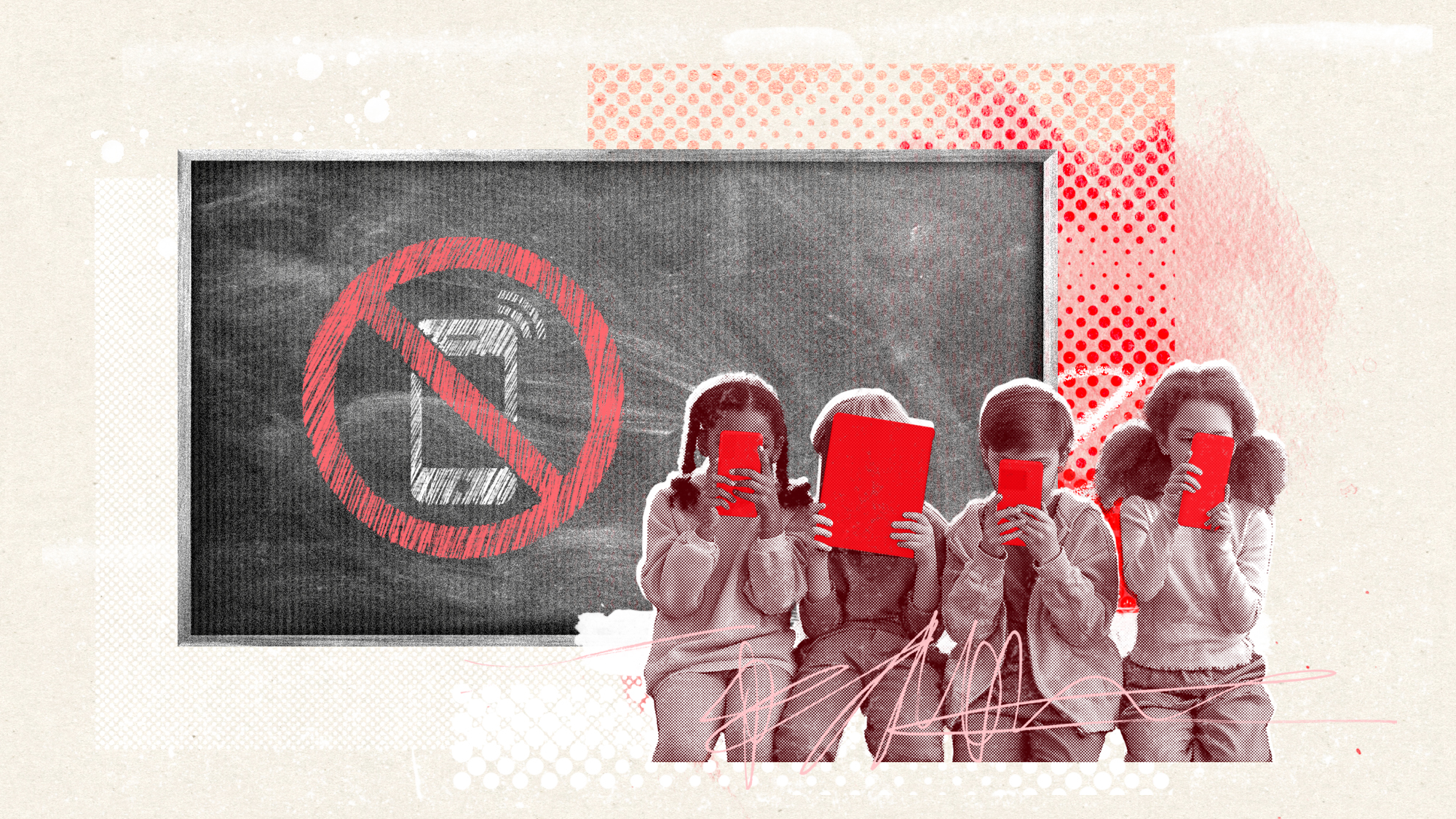The pros and cons of banning cellphones in classrooms
The devices could be major distractions


A free daily email with the biggest news stories of the day – and the best features from TheWeek.com
You are now subscribed
Your newsletter sign-up was successful
Many schools across the U.S. have floated the idea of banning cellphones in classrooms, and these bans largely have bipartisan support. Currently, 35 states have some rules or policies regarding classroom phone use. By another metric, “bans on phones are being enacted or proposed in at least 40% of national education systems, with the aim of helping students focus,” said The Economist. Despite this, not everyone agrees that completely banning cellphone use is a good idea, and some believe it can cause different types of harm.
Pro: Reduces distractions
Banning cellphone use in class can lead to more focused students. “The human brain is incapable of thinking more than one thing at a time,” said Michael Rich, an associate professor of pediatrics and an associate professor of social and behavioral sciences at Harvard University, to the Harvard Gazette. Cellphone usage in class can lead to distractions for all students, not just the one using the phone. “Students’ phones can make notification noises that disrupt class and embarrass the students,” said the East Hampton Star.
Removing cellphones “created an environment more conducive to learning” and led to “less student chatter and disruptive behavior,” said The Economist. One study also found that in classrooms without cellphones, “even teachers used their own phones less” and “they also became more engaged with pupils.”
The Week
Escape your echo chamber. Get the facts behind the news, plus analysis from multiple perspectives.

Sign up for The Week's Free Newsletters
From our morning news briefing to a weekly Good News Newsletter, get the best of The Week delivered directly to your inbox.
From our morning news briefing to a weekly Good News Newsletter, get the best of The Week delivered directly to your inbox.
Con: Reduces some learning opportunities
Technology is integral to today’s society. “Students need to learn the risks and opportunities that come with technology, develop critical skills and understand to live with and without technology,” said a 2023 report by UNESCO. “Shielding students from new and innovative technology can put them at a disadvantage.”
Students need to be taught “how to use cellphones and when to use them responsibly,” said Candice Breaux, the career and technical education supervisor at West Baton Rouge Parish Schools, to Education Week. “How do they know when it’s appropriate, where it’s appropriate, how it’s appropriate to use them?”
Pro: Can reduce the risk of mental health struggles
A lack of cellphones could make many students feel more comfortable. One school in Texas that implemented a ban “reported more participation by students and also said they saw student anxiety plummet — mainly because students weren’t afraid of being filmed at any moment and embarrassing themselves,” said NPR. This also reduces cyberbullying.
Constant access to social media has led young people to become more depressed. “School hours could provide a large chunk of the day that they get a break from screens, which might have a positive impact on mental health,” said Care.com.
A free daily email with the biggest news stories of the day – and the best features from TheWeek.com
Con: Challenging to implement
Enforcing cellphone policies “adds one more task to a teacher’s long to-do list,” said Care.com. It may become more burdensome to enforce a total ban than just to teach students to use phones responsibly. “Teachers could spend a lot of energy and effort fighting [cellphones], but I don’t know how far they really would get,” Lauren Tavarez, director of digital learning at the Ector County Independent School District in Texas, said to Education Week.
In addition, even if a ban is implemented, “there are still tablets and laptops — intended as aids to classroom instruction but offering many of the same temptations to distraction,” said The Economist.
Pro: Improves grades and learning
Removing cellphones reduces cheating. No cellphone access forces students to learn the material. “With virtually everything at their fingertips on an Internet-connected phone, students can not only look up answers but also use AI chatbots to generate text, thus evading in-class writing assignments,” said Britannica. Without phone access, students pay attention and absorb the material.
“For low-achieving students, even modest differences can really matter,” Louis–Philippe Beland, an economist at Carleton University in Ontario, said to The Economist. A study performed in India found that students in phone-free classrooms performed better academically, especially in non-STEM classes.
Con: Reduces sense of safety
Banning cellphones limits students’ abilities to contact their loved ones in case of an emergency. The most common reason given by parents to keep school phone access was to be “able to get in touch if there’s an emergency,” said NBC News. This is especially pertinent with the rise of gun violence in schools.
“It is a very sad state of affairs that one of the reasons we think we have to have phones in the classroom is so when the shooting starts, students can call and say goodbye or let people know that this is happening,” Robin Gurwitch, a psychologist at Duke University, said to NBC News.
Devika Rao has worked as a staff writer at The Week since 2022, covering science, the environment, climate and business. She previously worked as a policy associate for a nonprofit organization advocating for environmental action from a business perspective.
-
 Witkoff and Kushner tackle Ukraine, Iran in Geneva
Witkoff and Kushner tackle Ukraine, Iran in GenevaSpeed Read Steve Witkoff and Jared Kushner held negotiations aimed at securing a nuclear deal with Iran and an end to Russia’s war in Ukraine
-
 What to expect financially before getting a pet
What to expect financially before getting a petthe explainer Be responsible for both your furry friend and your wallet
-
 Pentagon spokesperson forced out as DHS’s resigns
Pentagon spokesperson forced out as DHS’s resignsSpeed Read Senior military adviser Col. David Butler was fired by Pete Hegseth and Homeland Security spokesperson Tricia McLaughlin is resigning
-
 American universities are losing ground to their foreign counterparts
American universities are losing ground to their foreign counterpartsThe Explainer While Harvard is still near the top, other colleges have slipped
-
 How Mississippi moved from the bottom to the top in education
How Mississippi moved from the bottom to the top in educationIn the Spotlight All eyes are on the Magnolia State
-
 How will new V level qualifications work?
How will new V level qualifications work?The Explainer Government proposals aim to ‘streamline’ post-GCSE education options
-
 England’s ‘dysfunctional’ children’s care system
England’s ‘dysfunctional’ children’s care systemIn the Spotlight A new report reveals that protection of youngsters in care in England is failing in a profit-chasing sector
-
 School phone bans: Why they're spreading
School phone bans: Why they're spreadingFeature 17 states are imposing all-day phone bans in schools
-
 Schools: The return of a dreaded fitness test
Schools: The return of a dreaded fitness testFeature Donald Trump is bringing the Presidential Fitness Test back to classrooms nationwide
-
 Send reforms: government's battle over special educational needs
Send reforms: government's battle over special educational needsThe Explainer Current system in 'crisis' but parents fear overhaul will leave many young people behind
-
 Education: America First vs. foreign students
Education: America First vs. foreign studentsFeature Trump's war on Harvard escalates as he blocks foreign students from enrolling at the university
